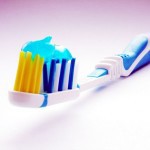If you’ve noticed that your gums are red and puffy, or that they bleed whenever you brush your teeth, you may have gingivitis.
 Gingivitis is defined as an inflammation of the gums without any loss of the attachment to the tooth. When the gums start to recede from the tooth, gingivitis has advanced to a disease known as periodontitis. Please note that in this article, I am referring to gingivitis caused by plaque build-up. There are many other causes of gum enlargement you can read about here.
Gingivitis is defined as an inflammation of the gums without any loss of the attachment to the tooth. When the gums start to recede from the tooth, gingivitis has advanced to a disease known as periodontitis. Please note that in this article, I am referring to gingivitis caused by plaque build-up. There are many other causes of gum enlargement you can read about here.
Luckily, gingivitis is completely curable. It is important to remember that gingivitis doesn’t just spontaneously occur, it is usually associated with poor oral hygiene. The secret to curing gingivitis lies in improving oral hygiene.
Four Tips to Cure Gingivitis
1. Brush Your Teeth. Brushing helps remove plaque. Since most gingivitis is caused by plaque, you can reduce the gingivitis by removing the cause — plaque. It is a good idea to try to brush twice daily. If you brush too much, you can end up irritating your gums.
2. Floss Daily. Flossing can remove a lot of the plaque that gets stuck under the gum line. If you let the plaque grow under the gums, it can really irritate your gums and cause gingivitis. By removing this sub-gingival plaque, the swelling in your gums will go down.
3. Using an irrigation device such as a WaterPik will drastically reduce gingivitis by flushing the bacteria out of your mouth. Irrigation devices can reach under the gums and dislodge plaque that might otherwise be inaccessible. This hard-to-remove plaque is one of the main causes of gingivitis and removing it will greatly improve gingival health. Many devices provide a pulsating stream of water, which has been shown to be ideal.
Once your gums return to a nice coral-pink color, it is not necessary to use a WaterPik or other irrigation device unless your gingivitis returns. The main benefit of these irrigation devices is in reducing gingivitis, not maintaining gum health.
4. Use a Mouth Rinse. The book Primary Preventive Dentistry by Norman O. Harris recommends using “over-the-counter products with essential oils, such as Listerine, or dentist prescribed chlorhexidine mouthrinses.”
Many mouth rinses have antibacterial properties that will help your gums return to health. The best rinse to help fight gingivitis is chlorhexidine (marketed in the USA under the brand name Peridex.) However, it can sometimes be expensive. If you are open to trying new things, there have been some studies to suggest that oil pulling may be a cheaper alternative to chlorhexidine in fighting gingivitis.
Good Luck
It is fortunate that gingivitis can be cured. Unfortunately, after about a month of not brushing, gingivitis can progress to periodontitis which can cause you to lose your teeth.
If you follow the tips above, you should get your gums back to good health in a week or two.
If you have any questions or comments about gingivitis, I would love to hear about them in the comments below.

OralMax Gum Disease Treatment can help you with bleeding gums, inflammation, sensitivity and dental mobility. Can help stop bone loss and reduce the dental mobility from grade 2 to grade 0 (Miller’s Classification).
All this thanks to the tannin acids (astringent) naturally obtained from different quercus species evaluated and recognized as an effective substance against bleeding gums, inflammation and dental mobility in diabetic and non-diabetic patients.
Thanks for commenting, Fernando. It sounds like you might be affiliated with OralMax, so we should probably disclose that.
Also, are there any published studies that verify OralMax’s effectiveness? That would be interesting to learn more about.
I have a question. My daughter just turned a year old on the 15th of january and we just went to the docctors to see whats going on with her mouth. I know she is teething but her gums are so swollen that it looks like her teeth are going back in to her gums and she has sores on the back side of her teeth. The doc said its gingivitis but i would like a second oppinion. And when should she go see a dentist?
Hi Lindsey – The American Academy of Pediatric Dentistry recommends that kids visit the dentist by their first birthday. Without seeing your daughter, it’s hard to tell what is going on. These two articles may help:
What to Expect at Your Child’s First Dental Visit and
At What Age Should Your Child Go to the Dentist for the First Time?